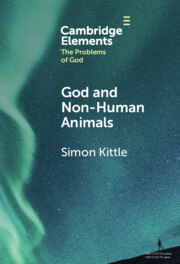Element contents
God and Non-Human Animals
Published online by Cambridge University Press: 20 March 2025
Summary
- Type
- Element
- Information
- Series: Elements in the Problems of GodOnline ISBN: 9781009296205Publisher: Cambridge University PressPrint publication: 27 March 2025

